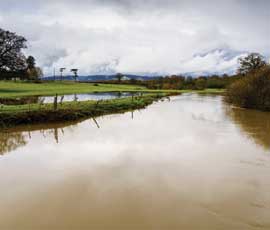Dredging plans challenged by environmentalists

Plans to give farmers more freedom to maintain watercourses themselves have met renewed opposition from environmental groups.
The Blueprint for Water coalition, which comprises a range of 41 organisations, from Greenpeace to the Badger Trust, wrote to the government this week claiming that any relaxation of dredging rules would result in a “triple whammy” of damage to wildlife, increased flooding and potential legal challenges for landowners.
“We do not believe that a return to ad-hoc and uncoordinated river ‘maintenance’ has a role to play in the future.”
Such a move risked causing significant environmental damage and could exacerbate flooding risk downstream, it said.
“Wetland wildlife is in crisis, despite the range of legislation designed to protect and enhance it. We understand the difficulties that heavy rainfall events bring for farmers and for food production. However, data from the Environment Agency suggests widespread non-compliance with legislation is at the root of many of the runoff and siltation problems facing our rivers and wetlands.”
The coalition also warned that giving landowners more freedom could expose them to potential legal challenges if they inadvertently fell foul of legal requirements.
Farmers Weekly Farmer Focus writer Simon Beddows, who manages 1,000ha of arable land close to the Thames in south Oxfordshire, said there needed to be a more joined up approach between the EA and landowners and added that it was a misconception that giving farmers more flexibility to manage watercourses would result in environmental damage.
“It’s not about ripping out environmental features; we just want to make sure there’s a sensible water flow.
“We have a Higher Level Stewardship scheme for overwintering wading birds on the farm and the last thing we want to do is destroy that habitat. But last winter, 400 acres were under water, which was no good for the birds or the farm business. About half of the land was grassland and the rest arable, where we lost about 50% of crops. We only managed to get 20% back in the ground, so there was a substantial amount lost.”
While it was important landowners should be able to maintain ditches and streams, the biggest issue was on major rivers, such as the Thames, he added.
“All of the Environment Agency’s maintenance and improvement work is focussed on flood alleviation works in the town and cities, while elsewhere silt is allowed to build up in the river. Dredging the Thames would not only give our streams and ditches an outfall, but would also alleviate flooding in the towns. It seems to me that spending millions on fancy flood defences makes it look like they are doing something.”
